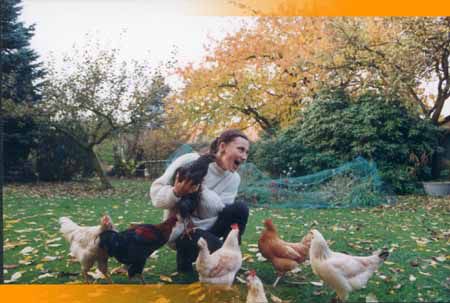
The photographer about herself
A chicken like you and me
Time and again I am asked, "Where do you get these photogenic chickens from?"
Well, when I decided to develop this new type of animal photography, I first drove to a farm which had several hen batteries. The farmer led me to the barns and left it to me to select two chickens.
The feeling when the heads of 100,000 hens looked in my direction while the heavy iron door closed behind me is one I will never forget.
It was not possible for sunlight to pass through the narrow ventilation flaps, and so here there was only eternal neon light. They stood there in groups of four with their feet on a grate in a cage measuring less than half a square meter.
Which two hens in these endlessly long rows of cages should have the fortune of experiencing a better future? I pointed to one hen, then another, incapable of deciding when faced with this mass of suffering creatures.
Impatient at my indecisiveness, the farmer roughly grabbed four hens' legs and held the animals with their heads hanging down in front of my face.
Unhappy only to be able to save two of so many hens, I took hold of them, whereupon we were politely but firmly pushed back into the open air by the owner. It was obvious that here hens were stored like goods, without the slightest respect for their life or their needs.

If I had initially thought that my two hens would be extremely happy about their new freedom, then I was wrong.
Once they had been released on to the lawn they remained rooted to the spot as if they were in a trance, and flinched as soon as a breath of wind rustled the leaves of the nearby tree. Even the most appetizing "chicken tidbits" that I put in front of them did not trigger the slightest desire to eat.
For their protection I built a sort of enclosure, but even here they did not seem to feel any safer or happier. I put them here, I placed them there, but all the time they stood around apathetically.
After all my efforts and my encouragement had come to nothing, I was convinced that they would not survive the first week of freedom. But then I had the bright idea that saved the situation: I acquired for them a cockerel that was used to living in freedom. Within the twinkling of an eye he taught them how to eat and how to move - in short, everything that a chicken's life really involves.
I could clearly see how their joie de vivre increased from day-to-day. Once I witnessed something which moved me deeply. In the enclosure there was a box with an open moveable door. One hen plucked up the courage for the first time to jump down onto this box.
It then repeated this jump time and again without becoming tired of it. Although it was extremely careful at first and took several approaches, it was soon balancing on the top of the shaking door with its wings tottering to and fro. Again it jumped down, then returned to the top, trying new variations, finally landing on the ground again and then shooting like an arrow with its wings flapping and cackling with excitement around the enclosure for a while.
That a small creature like this chicken feels a deep sense of joie de vivre and pleasure in being able to move freely cannot be demonstrated more clearly than in this scene.
By the way, we call her "The Lady "and today she reigns as "supreme commander" with Rudi the cockerel over a group of 13 hens. From many years of observing several generations of chickens I am now quite sure that an ordinary chicken has a feeling of self, a feeling of identity.
It possesses a wealth of emotions and individual possibilities to express itself, which we humans, in our smugness, generally believe only we are capable of. As we use chickens for food, we owe it to them to provide them with an appropriate way of life in accordance with their requirements.
But, maybe owing to the very fact that we "use" chickens, the way we treat them is not only lacking in respect, but also full of contempt. We overlook only all too easily the fact that diseased and maltreated animals can never provide us with healthy nourishment.
Recently, our indifference towards life and nature has rebounded on us in the form of high blood pressure, raised cholesterol levels, cancer, BSE, and so on and so forth. Only a clear NO from the consumer will protect him or her and gradually help our fel-low creatures to live in better conditions.
For this reason I have been a strict vegetarian for some years. The eggs which my chickens produce taste excellent, and in the summer I have known a chicken to visit me on the lawn to lay an egg next to me. If that wasn't a present, I don't know what is!
Renate Spekowius